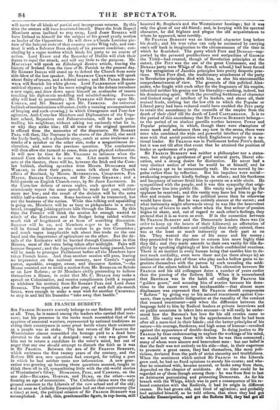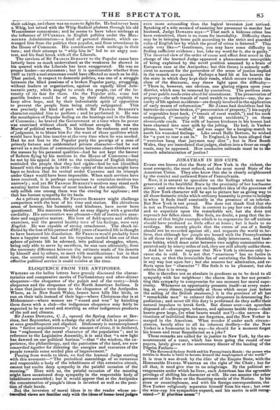SIR FRANCIS BURDETT.
SIR FRANCIS BURDETT scarcely belongs to our Reform Bill period at all. True, he is named among the leaders who carried that mea- sure ; but his presence in the ranks much resembled that of the spectres of ancestral warriors, represented by national traditions as aiding their countrymen in some great battle where their existence as a people was at stake. The last return of Sir FRANCIS for Westminster almost resembled the homage paid to a dead hero elevated to the rank of a demigod many a vote was given for him not to return a candidate to the voter's mind, but out of anger that any one should attempt to disturb the faith as it was in Sir FRANCIS. Between the sera of Sir FRANCIS BURDETT, which embraces the first twenty years of the century, and the Reform Bill era, new questions had emerged, for taking a part in which he had neither taste nor information. A new gene- ration was growing up hearing those questions mooted, taught to think them all in all, sympathizing little with the old-world stories of Westminster's Glory. HUSKISSON, PEEL, and CANNING, on the one side—RICARDO, HORNER, and HUME, on the other—were forming an age of economists. The Catholic claims were the only ground common to the Liberals of the new school and of the old; and as soon as Catholic Emancipation had set that controversy (for a time) at rest, the political mission of Sir FRANCIS Bran= was accomplished. A tall, thin, gentlemanlike figure, in top-boota, still
haunted St. Stephen's and the Westminster hustings ; but it was only the ghost of our old friend ; and, in keeping with his spectral character, he did frighten and plague the old acquaintances to whom he appeared, most terribly.
Sir FRANCIS BURDETT was an historical character long before his death ; and his true value can only be estimated by carrying one's self back in imagination to the circumstances of the time in which he flourished. The party which PITT and DuNnas—sup- ported by the personal predilections and antipathies of GEORGE the Third—had created, though of Revolution principles at the outset, (for PITT was the son of the great Commoner, and the Duanas party were Whigs of the Scotch school,) had been forced by the antagonism of Jacobin principles into pretty despotic prac- tices. When PITT died, the traditionary attachment of the party to Revolution principles died with him, as also his statesmanlike comprehensiveness of view. The generals of this political Alex- ander, who fought with each other for the fragments of his empire, inherited neither his genius nor his liberality—nothing, indeed, but his domineering spirit. With the prevailing feebleness of character and limited range of intellect of its leaders, and above all, their mutual feuds, nothing but the low ebb to which the Popular or Liberal party had been reduced could have enabled the PITT party to retain the ascendancy in the councils of the empire from the death of their chief till the death of Lord CASTLEREAGH. It is to the period of this ascendancy that Sir FRANCIS BURDETT belongs— to the period of an aimless guerilla warfare between Power and Popular principles, in which, though there were champions of more mark and substance than any now in the arena, there were none who combined the wide and powerful intellect of the states- man with that social position which Englishmen require in a na- tional leader. Sir FRANCIS was in Parliament before Ear's death, but it was not till after that event that he attained the position of leader or spokesman of a party. Sir FRANCIS &Rpm was neither a philosopher nor a states- man, but simply a gentleman of good natural parts, liberal edu- cation, and a strong desire for distinction. He never had a very distinct notion of what he would be at himself, and he was always apt to be unnecessarily rash. He was moved by im- pulse rather than by reflection. But his impulses were social— awakening responsive kindly feelings in others ; and his frankness and buoyancy of nature fitted him to operate on a wide circle. He sympathized with the people, and it was this sympathy that origi- nally threw him into public life. His vanity was gratified by the applause he received; and this vanity may have led him to go fur- ther and remain longer in the political arena than he otherwise would have done. But he was entirely sincere at the outset ; and what insincerity might afterwards creep in was like the benevolent hypocrisy of lovers to each other when the first ardour of passion begins to abate, and, out of regard to each other's feelings, they pretend that it is as warm as ever. If in the connexion between Sir FRANCIS BURDETT and the Democratic leaders there was (in order to keep up the hearts of their followers) an affectation of greater mutual confidence and cordiality than really existed, there was at the least as much insincerity on their part as on his. They wanted the use of his name and his money ; they pretended to the populace to esteem him more highly than they did ; and they made amends to their own vanity for this du- plicity by speaking slightingly of him in their confidential reunions. There is an instinct in every human being that enables him to de- tect mock cordiality, even were there not (as there always is) an inclination on the part of those who play such a hollow game to in- gratiate themselves with the patron by each revealing the midi- sances of the others behind his back. The alienation between Sir Fa/users and his old colleagues dates a number of years earlier than the passing of the Reform Bill. When it is remembered that BENTHAM was in the habit of calling Sir FRANCIS his "golden goose," and accusing him of avarice because his dona- tions to the cause were not inexhaustible—that almost more displeasure was expressed that Sir FRANCIS should compromise " Reform" by giving way to his natural resentment against Coil- BETT, than sympathetic indignation at the rascality of the conduct that roused resentment—and when the difference between the language held to him by Radical leaders at private interviews and on public occasions is taken into account—it will easily be under- stood how the Baronet's hot love for his old cronies came to cool. His vanity was hurt by the apprehension that he had been after all a mere tool in their hands ; and the better principles of his nature—his courage, frankness, and high sense of honour—revolted against the appearance of double-dealing. In doing justice to Sir FRANCIS by thus endeavouring to explore the workings of his mind, we would not wrong those with whom he was then connected ; many of whom were sincere and benevolent men : but our belief is that the fault was not entirely on his side—that, in their eagerness to promote a great cause, they had themselves, like most poli- ticians, deviated from the path of strict sincerity and truthfulness. When the sentiment which united Sir FRANCIS to the Liberals grew cool, he had no fixed opinions to steady his course; and whe- ther he remained with, became neutral, or broke away from them, depended on the chapter of accidents. At no time could he be regarded as of them though among them : he was from first to last an Aristocrat patronizing and protecting Democrats. As for his breach with the Whigs, which was in part a consequence of his re- laxed connexion with ;he Radicals, it had its origin in different causes. He had grown old, and tired of agitation ; and probably had satisfied himself, as he told others, that since they had got Catholic Emancipation, and got the Reform Bill, they had got all their askings, and there was no more to fight for. He had never been a Whig, but mixed with the Whig-Radical phalanx through his old Westminster connexions; and he seems to have taken umbrage at the influence of O'CONNELL in English politics under the MEL- BOURNE Administration—a kind of personal distaste, which es- tranged him from the politics then popular, and from attendance in the House of Commons. His constituents took umbrage in their turn ; and their attempt to " whip him in" led to an angry con- test, and his final break with all the Liberals.
The services of Sir FRANCIS BURDETT to the Popular cause have latterly been as much undervalued as the weakness he showed in his quarrel with the Liberals has been exaggerated. He was no proper leader—no statesman ; but it is questionable whether from 1807 to 1819 a real statesman could have effected so much as he did. That period, in respect to domestic politics, was one of a struggle between the blind passions of a broken Popular party, struggling, without leaders or organization, against an equally blind Aris- tocratic party, which sought to crush the people, out of the in- tensity of its fear for them. On the Popular side, none but guerilla leaders could be of use, by their dashing exploits to keep alive hope, and by their indomitable spirit of opposition to prevent the people from being utterly subjugated. This was precisely the kind of part which Sir FRANCIS Bottom's character enabled him to perform ; and he performed it. He was the mouthpiece of Popular feeling on the hustings and in the Houk of Commons ; he braved the Government at a time when its power was exercised without check and without scruple. He was the Murat of political warfare. To blame him for rashness and want of judgment, is to blame him for the want of those qualities which would have kept him inactive at the very time when he was needed. Had he not lent to the Popular party the prestige of a man of princely fortune and unblemished private character—had he not served as a medium of communication between closet-thinkers and the masses by his personal qualities—had he not kept the banner of Reform flying by his motions in the House of Commons—had he not by his appeal in 1810 to the traditions of English liberty reminded the people that they had rights—had he not identified himself with the people in 1819—the spirit of the nation might have bten so broken that its revival under CANNING and its triumph under GREY would have been impossible. When such services have been received, it is perhaps ungracious to scrutinize motives too narrowly ; and yet Sir FRANCIS BURDETT'S motives may stand such scrutiny better than those of most leaders of the multitude. The only selfish one among them was the craving for applause ; and that has human sympathy for its basis.
As a private gentleman, Sir FRANCIS BURDETT might challenge comparison with the best of his time and station. His chivalrous sense of honour, his humanity and kindness, have never been questioned. His manners blended an easy dignity with a graceful cordiality. His conversation was pleasant—full of instructive anec- dote and suggestive matter. His love of field-sports and athletic exercises, and the general healthy tone of his feelings, were very English. He was capable of strong attachment. The shock in- flicted by the loss of his partner of fifty years of married life is thought to have hastened his dissolution. Sir FRANCIS would probably have been a happier man had not his impulses carried him out of that sphere of private life he adorned, into political struggles, where, being only able to serve by sacrifices, he was sure ultimately, from the necessary difference between the estimate made of his deserts by himself and by others, to meet with mortifications : but in that case, the country would most likely have gone without the most effective political service it could receive at the time.



























 Previous page
Previous page